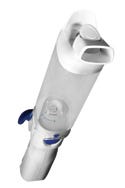The Tech Group Implements Quality System for New Insulin Device
OUTSOURCING NEWS
August 1, 2006
|
The FDA approval of Exubra, an inhaled insulin and delivery system by Nektar Therapeutics (San Carlos, CA), has garnered much attention in both the device and pharmaceutical industries. But to develop such a device, Nektar had to create powdered insulin and a delivery system that would ensure that the insulin particles reach the alveoli deep inside the lungs. This challenge required a stringent quality system and processes that would ensure that each device would be made the same way, with the same tolerances and with the same quality control.
Nektar partnered with The Tech Group (Scottsdale, AZ), a division of West Pharmaceuticals. The project required the contract manufacturer to quickly shift from being a subassembly manufacturer to a finished-device contract manufacturer, says Mike Treadaway, general manager of drug-delivery devices at The Tech Group. It handled design for manufacturability factors and developed automation systems for assembling the device and creating tooling for molding. Then it validated the whole process.
Because patients would be using the devices, the design had to be very robust. “A lot of care was taken to have automation inspections to make sure that every device off the line would operate flawlessly in the field,” says Treadaway. But because the device had already been in clinical trials for six years, the contract manufacturer was not allowed to change the design or materials of the device. “Because of the blockbuster potential of this product,” Treadaway explains, “all of those factors had been locked down.” Many of the parts were injection molded and intricately assembled, so the firm created processes that could handle large, complex programs.
In addition, the new-drug application that had been filed required a quality system to be in place that would meet FDA regulations. “We decided to do it from the get-go,” notes Treadaway. “It was a huge undertaking.” FDA declared the firm compliant after the first inspection. However, the road there was not easy. “It took several years of internal audits,” he remembers. “We hired consulting companies that had ex-FDA inspectors to come in and interview employees, review training, look at our quality systems, etc. We had mock inspections to see how everything would work.”
Treadaway credits this success to the company's preparation. “You must have a robust quality system and be prepared for FDA to walk in the door and do an audit any day of the week,” he says. “Make sure you maintain a high level of discipline in the organization.” It is important not to underestimate the responsibility a firm has, from top management on down, when making a device that people depend on. “We had to do a lot of teaching for our employees to understand how diabetes works, and how diabetics' lives are, to make a high-quality product.”
The Tech Group also set up a management system with Nektar. There was an executive-level steering committee that met face to face quarterly and via telephone once a month. Subteams were set up underneath the steering committee to manage different aspects of the project. Those subteams met regularly as well and reported up through program managers to the steering committee.
Copyright ©2006 Medical Device & Diagnostic Industry
About the Author(s)
You May Also Like


.png?width=300&auto=webp&quality=80&disable=upscale)
